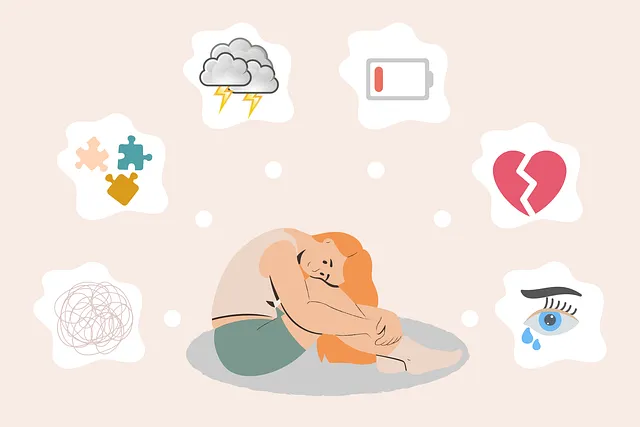Arvada Kaiser Permanente psychiatry emphasizes the power of positive thinking for mental wellness, offering Cognitive Behavioral Therapy (CBT) and holistic practices like mindfulness exercises and compassion cultivation. Integrating daily affirmations, gratitude, and reframing negative thoughts improves mood, reduces stress, and boosts resilience. Through community programs, they guide individuals in these techniques to reduce stigma, manage anxiety, and navigate challenges effectively. Consistent practice enhances well-being, fosters mental toughness, and empowers people to prioritize their mental health for long-term success.
Positive thinking is a powerful tool that can significantly impact mental health and overall well-being. In this article, we explore how cognitive behavioral therapy (CBT), offered by Arvada Kaiser Permanente Psychiatry, leverages positive thinking exercises to transform lives. We’ll guide you through understanding the concept, implementing daily practices, and uncovering the long-term benefits of regular positive thinking. Learn valuable tips for consistency and discover how this approach can enhance resilience, fostering a happier, healthier mind.
- Understanding Positive Thinking and Its Impact on Mental Health
- Arvada Kaiser Permanente Psychiatry: A Center for Cognitive Behavioral Therapy (CBT)
- Implementing Positive Thinking Exercises in Daily Life
- Benefits of Regular Practice: Enhancing Resilience and Well-being
- Overcoming Challenges: Tips for Consistency and Long-term Success
Understanding Positive Thinking and Its Impact on Mental Health

Positive thinking is a powerful tool that can significantly influence mental health and overall well-being. It involves training the mind to focus on positive aspects, fostering optimism and resilience. This practice encourages individuals to reframe negative thoughts into more constructive and uplifting perspectives. Research suggests that cultivating positive thinking can reduce stress, anxiety, and depression while enhancing self-esteem and life satisfaction.
At Arvada Kaiser Permanente psychiatry, we emphasize the importance of positive thinking as a key component of holistic mental health care. By integrating self-care practices and conflict resolution techniques, our approach empowers individuals to develop emotional intelligence—the ability to recognize and manage one’s own emotions while understanding those of others. This leads to improved relationships, better stress management, and overall resilience in navigating life’s challenges.
Arvada Kaiser Permanente Psychiatry: A Center for Cognitive Behavioral Therapy (CBT)

Arvada Kaiser Permanente Psychiatry offers a specialized center for Cognitive Behavioral Therapy (CBT), a proven and effective approach to mental wellness. CBT is a form of talk therapy that focuses on identifying and changing negative thought patterns and behaviors, empowering individuals to take control of their emotional well-being. Through this evidence-based practice, patients learn valuable coping strategies and skills to manage stress, anxiety, depression, and other common mental health challenges.
The center’s experienced therapists utilize various techniques, including mindfulness exercises and compassion cultivation practices, to facilitate emotional healing processes. By engaging in the Mental Wellness Podcast Series Production, individuals can access valuable resources and gain insights into CBT techniques, fostering a deeper understanding of their mental health journey. This holistic approach ensures that patients receive comprehensive care tailored to their unique needs, ultimately enhancing their ability to navigate life’s challenges with resilience and improved mental wellness.
Implementing Positive Thinking Exercises in Daily Life

Integrating positive thinking exercises into daily routines can significantly enhance mental well-being, as advocated by experts at Arvada Kaiser Permanente’s psychiatry department. These practices aim to cultivate optimism and resilience, offering a powerful tool in managing stress and anxiety. By dedicating just a few minutes each day to such activities, individuals can experience improved mood and overall life satisfaction. For instance, starting the day with affirmations or engaging in gratitude practices can set a positive tone, fostering a mindset conducive to better decision-making and problem-solving.
Arvada Kaiser Permanente’s community outreach programs emphasize the importance of these exercises as part of their Mental Illness Stigma Reduction Efforts. Through workshops and initiatives, they guide individuals on how to incorporate techniques such as mindfulness meditation, positive self-talk, and reframing negative thoughts into manageable strategies. Such initiatives not only contribute to Anxiety Relief but also empower people to navigate life’s challenges more effectively, creating a supportive network within the community.
Benefits of Regular Practice: Enhancing Resilience and Well-being

Regular practice of positive thinking exercises offers a multitude of benefits, with one of the most significant being enhanced resilience and improved well-being. By cultivating a mindset focused on optimism and gratitude, individuals can better navigate life’s challenges. This proactive approach equips them to cope with stress, anxiety, and adversity more effectively, fostering mental toughness and adaptability. Research suggests that regular practice of compassion cultivation practices, like those offered by Arvada Kaiser Permanente psychiatry services, can reduce symptoms of depression and anxiety while increasing feelings of connection and empathy towards oneself and others.
Integrating these exercises into a self-care routine development for better mental health becomes a powerful tool for personal growth. It encourages individuals to prioritize their mental well-being, much like one would maintain a physical fitness regimen. This consistent practice can lead to profound changes in perspective, enabling people to see setbacks as opportunities for growth rather than insurmountable obstacles. Moreover, it empowers them to take proactive steps towards managing their mental health, thereby reducing risks associated with untreated or improperly managed conditions, as highlighted in risk assessments for mental health professionals.
Overcoming Challenges: Tips for Consistency and Long-term Success

Overcoming challenges is a vital aspect of implementing positive thinking exercises, especially when it comes to long-term success in mental health initiatives like those offered by Arvada Kaiser Permanente psychiatry. Consistency is key; individuals must integrate these practices into their daily routines for sustained benefits. One effective strategy is to establish structured self-care routines, similar to what’s promoted in Mental Health Education Programs Design, where dedicated time slots are allocated for activities that cultivate positivity and mindfulness.
In navigating potential setbacks, it’s crucial to approach challenges with resilience and a growth mindset. Adopting a mental health policy analysis and advocacy perspective can help individuals recognize barriers as opportunities for improvement. Regular reflection and adjusting strategies accordingly play a significant role in long-term success. By embracing self-care routine development, one can foster better mental health, enhancing overall well-being.
The implementation of positive thinking exercises, as demonstrated by the expertise at Arvada Kaiser Permanente psychiatry through Cognitive Behavioral Therapy (CBT), can significantly enhance mental health and well-being. Regular practice not only boosts resilience but also offers long-term benefits for overall happiness and life satisfaction. By incorporating these strategies into daily routines, individuals can navigate challenges more effectively, fostering a more positive and fulfilling lifestyle.






